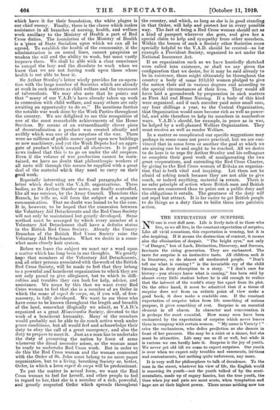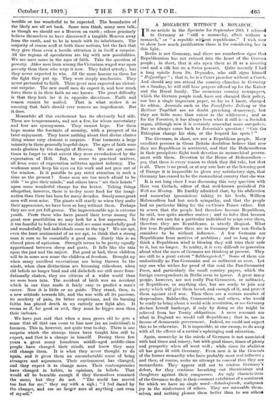THE EXPECTATION OF SURPRISE.
0 one is ever dull now. Life is lively index' to those who live, as we all live, in the constant expectation of surprise. Like all vivid sensations, this expectation is wearing, but it is also inspiring. If it means the destruction of content, it means also the elimination of despair. " The bright eyes," not only " of Danger," but of Luck, Distinction, Discovery, and Success, fascinate the rising generation. They are enchanted. The taste for surprise is an instinctive taste. All children seek it in literature, so do almost all uneducated pebple. " Don't tell me what is coming ! " is the invariable cry of the child listening in deep absorption to a story. "I don't care for history— you always know what is coming," has been said by almost every little student before he is old enough to realize that the interest of the world's story lies apart from its plot. On the other hand, it must be admitted that if a tissue of surprise does not from an artistic point of view make a good book, it does make a readable one. If the constant expectation of surprise takes from life something of serious purpose, it gives something of zest. Surprise is an essential element in all charm. In character and conversation it is perhaps the most essential. How many men have been enchanted by the expectation of surprise which never leaves them in company with certain women. " My name is Variety ! " cries the enchantress, who defies prediction as she dances in front of her pursuers. She may be a saint or a sinner, but she must be attractive. Life may use us ill or well, but while it is various we can hardly hate it. Surprise is the joy of youth. We never get old till we cease to expect surprises. Our youth is over when we expect only troubles and easements, frictions and contentments, but nothing quite unforeseen, any more. It is very well for philosophers to talk of decadence. To the man in the street, whatever his view of life, the English world is renewing its youth—not the youth talked of by the senti- mentalists, made up of sugary fancies, but the true youth, the time when joy and pain are most acute, when temptation and hope are at their highest power. There seems nothing now too
terrible or too wonderful to be expected. The boundaries of the likely are all set back. Some men think, many men talk,.
as though we should see a Heaven on earth ; others genuinely believe themselves to have discovered a tangible Heaven away from the earth, and to be in touch with its inhabitants. The majority of course scoff at both these notions, but the fact that they give them even a hostile attention is in itself a surprise.
All the regions of speculation are big with new possibilities.
We are once more in the ages of faith. Take the question of poverty. Abler men from among the Victorians waged war upon poverty than those who wage it now. They failed utterly; but they never expected to win. All the more honour to them for the fight they put up. They were simply ameliorists. They never pretended to faith. These great men expected no victori- ous surprise. The new small men do expect it, and how much force there is in their faith no one knows. The great difficulty is that they look for it in opposite directions. Faith and reason cannot be unified. That is what makes it so amazing that faith should ever remove an impediment. But it does.
Meanwhile all this excitement has its obviously bad side. There are temperaments, and not a few, for whom uncertainty and fear are synonymous. They cannot hope. For them hope means the foretaste of security, with a prospect of its later enjoyment. They know nothing about that divine elusive thing whose very element is surprise. - Fear torments a large minority in these generally hopeful days. The ages of faith were made glorious by the thought of Heaven. We are apt some- times to forget to what extent they were overshadowed by the expectation of Hell. But, to come to practical matters, all keen sense of expectation militates against industry. The workman must keep his eyes on his work and not gaze out of the window. Is it possible to pay strict attention in such a time as the present ? Some men are too much afraid to be able " to give their minds," and others have " set their hearts " upon some wonderful change for the better. Taking things altogether, however, there is to-day more food for the imagi- nation than there has been for many decades. Surely some great
men will. soon arise. The giants will startle us when they make their appearance, we have been so long without them. Perhaps
they are not yet full-grown. The impressionable age is extreme youth. Froth those who have passed their teens among the great new possibilities we may look for a few supermen. Is it too fanciful to believe that we shall see some wonderfully good and wonderfully bad individuals come to the top ? We are apt, even the least sentimental of us are apt, to think that a strong
man is sure to be essentially a good man. Surely this is an
absurd piece of optimism. Strength seems to be pretty equally apportioned between sheep and goats. It falls like the rain upon the just and the unjust. But good or bad, these children will be in some new sense the children of freedom. Brought up when many excellent conventions are being thrown to the winds, when class distinctions are becoming ridiculous, when old beliefs no longer bind and old disbeliefs are still more foun- dationally shaken, they are citizens of a wider world than we were born into. The accident of birth was an accident which in our time made it fairly easy to predict a man's career. Now it is little or no guide. They stand, then, in a new attitude towards life, and the war with all its passions, its mockery of pain, its bitter scepticisms, and its burning faiths has placed death in an entirely new light also. It seems as if, for good or evil, they must be bigger men than their forbears.
We have just said that when a man grows old he gets a sense that all that can come to him now (as an individual) is foreseen. This is, however, not quite true to-day. There is one surprise which the strange times have taught him still to expect, and that is a change in himself. During these few years a great many humdrum middle-aged middle-class people have changed their minds, and know they may still change them. It is what they never thought to do again, and it gives them an uncomfortable sense of being strangers and sojourners. Their environment has changed, and they expect it to change more. Their contemporaries have changed in habits, in opinions, in beliefs. That would all be bearable enough if they themselves remained the same, but they do not. " The world has moved too fast for me," they say with a sigh ; " I feel dazed by the changes, and am no longer sure of anything—not even of myself."



































 Previous page
Previous page